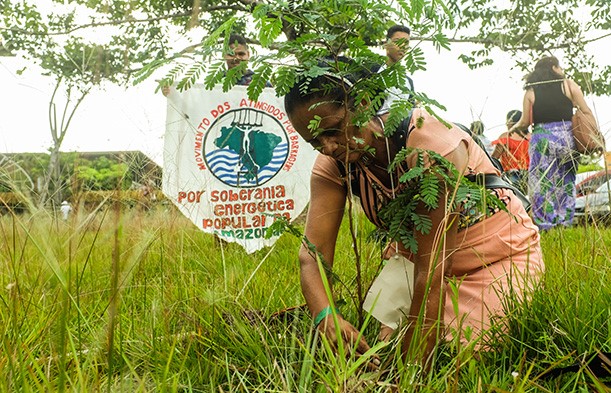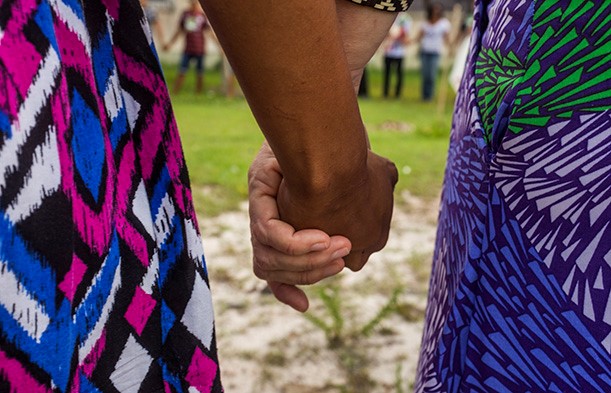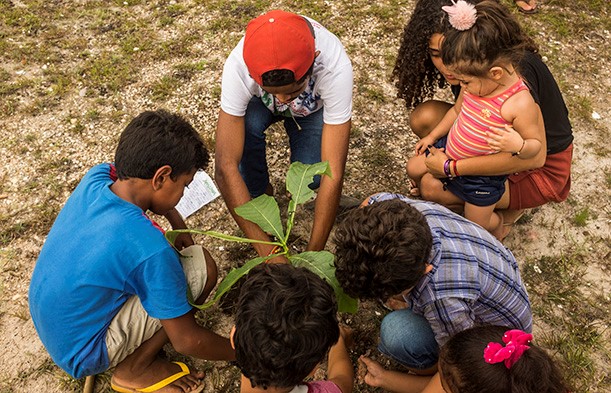‘Amazon at Risk – it affects us all’ This was the theme of an event held in Belém, in the Brazilian Amazon, which started on 28 October 2019. The event was organized by Christian Aid partner Movimento dos Atingidos por Barragens (MAB) -The Movement of People Affected by Dams.
The meeting also convened the We Are the Amazon Ecumenical Celebration, described in an earlier post, and explained in the video below:
The main goal of the Belem meeting was to complete a structural analysis of the present political, social and economical situation in the Amazon; to take into account the discussions that took place at the Amazon Synod of the Catholic Church in Rome; and to detail the attacks and threats currently affecting those living and defending the region.
‘This is not a conference to debate and take decisions,’ said Iury Paulino, one of the MAB coordinators, ‘but a chance to exchange experiences, to strengthen a common analysis of context and to find paths for fighting and resisting’.

The event brought together some 150 community leaders from 9 states of the Brazilian Amazon Region, drawn from various partner organizations.
The opening table was attended by the rector of UFPA, Emmanuel Tourinho. ‘Our mission is to create knowledge for sustainable development in the region,’ said Emmanuel Tourinho, Rector of the Federal University of Pará (UFPA). ‘This cannot be achieved without the participation of the peoples of the Amazon and the organizations that represent them. Therefore, your presence here is very valuable,’ he said.
Tourinho emphasized the commitment of the University to change leading to reduced social inequality, especially in the Amazon. ‘We live in a region where there has never been a national project concerned with generating income, inclusion and overcoming inequality. What we have are investments made in the region to address the interests of the few, who generally live outside the Amazon region,” he said.
Therefore, one of the University’s main concerns has been to support initiatives that have Amazonian peoples, not natural resources, at the centre of their discussions. In other words, the challenge is ‘how do we build a project that is thought out by the peoples of the Amazon’, said Gilberto Cervinski, from the national coordination of MAB, introducing a structural analysis of what is at stake in the Amazon.

He explained that today we are living in the phase of capitalism in which hegemony lies with the banks and international investment funds which pursue financial domination. States are in debt and the proposed solution is privatization of strategic enterprises, the end of public services and increased exploitation of workers by removing social rights.
‘What they are proposing,’ said Cervinski, ‘is to privatize the Amazon rainforest by issuing climate bonds, which means delivering the forest to the world’s financial funds. This solution benefits capital, while it represents an increase in misery and exploitation among the peoples in the region.’ He also stated that the Amazon is being targeted by the United States and that there are plans by the current Brazilian government to explore the rainforest in partnership with the Americans.
The only means to resist this offensive, he said, is popular organization. He gave an example of what is happening in Chile, Haiti and other countries of the world, where the people are rising up against the austerity measures imposed by international capital.
The meeting drew up a letter, published on 30 October:
Carta dos Atingidos e Atingidas da Amazônia
(Letter from all men and women affected by changes in the Amazon)
From the Cordillera of the Andes to the Atlantic forests of Brazil,
From our native rubber trees to our oil palm forests,
Among hundreds of indigenous and quilombola peoples,
From the Amazon River, from its sources to its mouth, its gorges, marshes and its villages,
With its diversity of fauna and flora, its shoals of fish,
Its traditional gold panners and family farms,
In the nine countries of its basin and the nine states of Brazil,
We are all the Amazon.
If the Amazon is in danger… we men and women are all affected!
We, the men and women affected from the nine states of the Brazilian Amazon, meeting together in the Federal University of Pará, in Belém, on 29–30 October, in the ‘Amazon in Danger: It Affects us All’ conference: we analized and debated the question of the Amazon and identified common initiatives to defend it. Here are the main ideas that were discussed:
- We are living in a world order in which the prevailing economic system is in deep crisis. We understand that capitalism, in order to increase its profits, seeks to appropriate strategic natural resources, to increase the exploitation of labour and to withdraw the rights that had been won by the peoples. The attacks on the Amazon are part of this picture.
- The Amazon is at the centre of a struggle between the economic and political interests of the local, national and international ruling classes. Among these sectors are the large farmers, timber merchants and agribusinessmen who set fire to the forest and intend to step up the annexation of new areas for cattle ranching, monocrop agriculture, the felling of timber and mining in protected areas, conservation reserves and the territory of traditional and indigenous peoples. Also in play are the interests of national and international groups, especially finance capital, in taking control of water, the forest, the biodiversity, the minerals, sources of energy and the land. Claiming to talk the language of conservation and the fight against climate change, these groups are seeking the privatization and transformation of the territory of the Amazon into a commodity.
- These sectors are responsible for a whole range of criminal practices, including: the large hydroelectric projects and mining; the steady advance of soya and cattle farming; the violence in the countryside; the privatization of water and forests; the clearances and deliberate burning; sexual exploitation, urban violence and drug trafficking; the increase in poverty; the violation of the rights of affected peoples; the criminalization and assassinations of human rights defenders.
- Historically, Amazonia has always been considered by the ruling elites as something ‘other’, at the service of their interests. The cry of its peoples was never heard, as the final document of the Amazon Synod makes clear. This situation was been made worse, especially with the emergence of governments of the extreme right, who impose a project of surrender and destruction, as is the case in Brazil today. The greatest risk to the Amazon at present comes from the initiatives of these governments to step up their exploration of the region, in a manner subordinate to US imperialism, under the false pretext of the defence of national interests.
- This reality shows that we are all, men and women, affected by the situation. As we denounce this project of capitalism, we can confirm that here there are peoples who are fighting and resisting, peoples who care about the future of the Amazon, of Brazil and of all humanity. Our battle is being fought in our lands, in the countryside, in the forests and in the cities, with the clear consciousness that this is something not restricted to local matters, but linked intimately to the struggles of all the peoples of Brazil and of the word, who defend our Common Home.
- Inspired by the message of the Amazon Synod, we identify with that struggle and commit ourselves to reinforce it, with happiness and hope, assuming in our practice the principles of Integrated Ecology, the care of the ‘common home’ and the defence of the Amazon.
- So that we can confront the challenges of the times in which we are living, we understand that the peoples of the Amazon cannot expect any measures to defend the Amazon from the ruling classes, because their projects are only those of destruction, exploration and subordination. The only possible alternative is by means of popular sovereignty. Therefore we make the following commitments:
- Organization is our strength and our means of struggle. Therefore it is necessary to make a radical improvement in our organizations by work at the grass roots, political training and broadening the participation of women and young people.
- We must strengthen the unity between the organizations who have committed to these principles, encouraging joint initiatives in defence of the Amazon and its peoples.
- We must raise the level of consciousness by means of shared knowledge and valuing the historic experience of struggle of the peoples of the Amazon and their organizations.
- We must build bridges of international unity with the peoples of Amazon in neighbouring countries who share our principles and desires and are our sisters and brothers, independently of institutional barriers and frontiers.
- We must fight without pause against unjust structures which oppress and exploit the peoples; fight in defence of live, for a new and just society, for freedom and equality.
To defend the Amazon is to defend life itself!
Water, energy, sovereignty, the distribution of wealth and popular control
Defender a Amazônia é defender a vida!
30 October 2019


